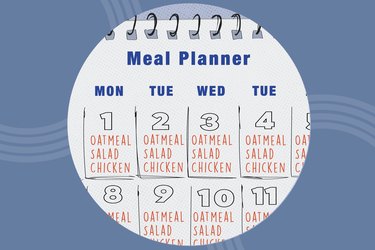
Having a go-to menu can save you time, money and the stress of answering "What's for dinner?" day after day after day. But while a repetitive meal plan might appeal to your schedule, wallet and emotional wellbeing, it may not satisfy all of your nutrition needs.
That's not to say that sticking to the same meals is always restrictive or unhealthy. Done right, it can provide plenty of essential nutrients and feel — dare we say — freeing. But how do you do it right?
Video of the Day
Video of the Day
For our Ask the RDs series, we asked readers to send us their biggest nutrition questions and then posed the 12 most common to a panel of registered dietitians. Here, the experts weigh in on eating the same thing every day and offer tips for adding variety to your diet without falling off the healthy-eating wagon.
Is It Bad to Eat the Same Foods Every Day?
"I always ask, 'What's the reason you eat the same foods every day?' A lot of people are afraid to eat certain foods, and there's a psychological aspect to that. But I always recommend variety.
Look at the fruits, look at the vegetables: There's a reason they're not all one color. Each one has different nutrients we need for good health.
I see people eat chicken every night; well, they're missing out on omega-3 fatty acids in salmon or the iron and zinc in beef. So they might get nutrition deficiencies by eating the same thing every day.
I'm seeing a lot of calcium and vitamin D deficiencies because many people aren't drinking dairy milk anymore. To make sure you're getting enough, I recommend three servings of dairy a day.
Many people are cutting down on beef, too, and I think that could result in them becoming deficient in iron and zinc. Focus on getting protein at each meal. And include whole grains. Some people are 'scared' to eat carbs, so they might see deficiencies in B vitamins and fiber. Top if off with essential fats such as walnuts, nut butters and avocado."
"I wouldn't say that eating the same foods every day is bad, but there are a few not-so-great outcomes from doing so.
For example, you could wind up getting bored and say, 'I don't want to eat this healthy stuff anymore,' when you could instead include more variety. By eating a variety of foods, you're also getting a variety of nutrients. By eating the same foods every single day, you're eliminating a variety of nutrients you need in your diet.
There is a misunderstanding of healthy food: Just because something is healthy doesn't mean you should eat it in unlimited portion sizes. For example, olive oil is healthy, but a whole cup of olive oil has about 2,000 calories.
If you're watching your weight, having oil in unlimited quantities would make it harder to lose the weight. Too much of anything is exactly that: too much."
"It's not bad, per se, to eat the same foods every day — it just limits the nutrients that you're exposed to. If your daily menu is extremely restrictive, it can lead to nutrient deficiencies.
For example, if someone follows a cauliflower or potato diet, then that can absolutely lead to health issues. And you might get palate fatigue because it gets boring."
"Some people get really bored and sick of eating the same foods every day, and that can really ruin their ability to stick with a diet or lifestyle, whereas other people find one thing they love or one thing that works for them and they stick with it.
It depends on the person. I think we all, at the end of the day, end up craving variety. If you're on a weight-loss or diet plan and use meal replacements or rely on meal prepping, switch it up and stay in tune with how you feel eating your meals. If you're not enjoying them anymore, that's when you're most likely to stray.
If someone absolutely hates vegetables and just can't find one they like, they might want to talk to their doctor about taking a supplement just to make sure they're not deficient in any important vitamins and minerals.
I'm a big fan of tracking — using a tracking app can help you see how all the foods you eat every day add up and which vitamins and minerals you are falling short on."
"While it can be easier to eat the same thing day in, day out, you'll get more nutrients in your diet by eating a wide variety of foods. Instead of just relying on fresh fruits and veggies, which may go bad before you can use them, you can add variety with frozen fruits and vegetables, canned beans, and nuts, seeds and herbs.
If you always eat the same grains, don't be afraid to try a batch of farro or barley. Mix and match new grains, veggies and proteins to make satisfying bowls. Have fun and try new things!"
The Takeaway
Eating the same foods every day isn't necessarily a bad thing, but variety is key. Excluding entire food groups or macronutrients can leave you deficient in important nutrients, and might cause you to reach for unhealthier options if you get bored. Your best bet is to incorporate as many different nutrient-dense foods as possible into your diet. Look to frozen fruit and veggies, canned beans, shelf-stable nuts and seeds, underappreciated whole grains and healthy fats to ensure you're getting a good variety of nutrients in each meal.
Confused about nutrition? Get answers to more common questions in our Ask the RDs series.




